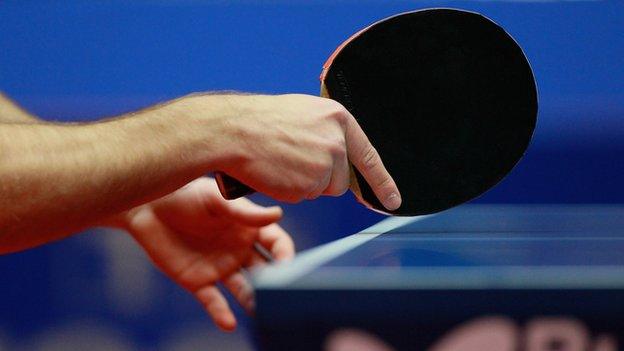Tin-Tin Ho, the teenage table tennis star named after her sport
- Published
Table tennis star Tin-Tin Ho reveals how her father named her after the sport
Generally speaking, an accepted sign of obsession is when you start naming children after things.
Charles Ho, we can safely say, is obsessed.
His first words to the BBC camera? "My name is Charles Ho. I love table tennis, which is my priority in life."
No kidding. We are on the ground floor of his Paddington house, which is home to a table tennis table, competition-standard flooring and not a lot else. There are more tables on other floors.
We are here to meet his daughter, Tin-Tin: 15 years old, Britain's leading junior player, a Commonwealth Games hopeful for England and who is not named after the comic-book character., external
"Tin-Tin? I took the initials TT, for table tennis," says Charles.
"It's quite embarrassing," says Tin-Tin, giggling. "He's really obsessed with table tennis so it's like, TT, table tennis, Tin-Tin.
"That's why my brother's called Ping as well."
Ping Ho, who used to play for England at youth level, now studies law when not serving as Tin-Tin's training partner.
"Ping's actually quite a common name but when you say you're Ping and you play ping-pong, then it gets interesting," he admits. "It's a bit gimmicky but as you grow older it's fine; it wears off.
"Tin-Tin narrowly escaped being called 'Pong', apparently."
Tin-Tin's name, Charles clarifies, does at least carry a double meaning. "It also means 'sky'. The sky is the limit."
That is not a phrase often associated with British table tennis.
The sport is dominated by China, whose athletes have won all but four of the 28 Olympic titles, external contested since table tennis was introduced at the Seoul Games of 1988.
Liam Pitchford, the best player in Britain right now, is currently 55th in the world, external on the back of a recent surge up the rankings. Nobody else from the UK is in the top 100. Tin-Tin, for context, is 376th in the senior women's list., external
She is, however, far younger than any counterpart on the British women's team - as evidenced by her bat, which has a bespoke handle because the usual ones were too large for her hands.
And she is incredibly active as a player. She has played 126 matches in the past year, more than anyone else in women's world table tennis, according to the sport's own statistics., external
Given the years she has left to develop and her promising start, is the sky actually the limit?
"Short-term, I'd like to make the Commonwealth Games and the Youth Olympics in 2014," she says. "Long-term, maybe qualify for an Olympics?"
Her family knows the latter ambition requires something special. Unlike London 2012, where Britain received places at the Games by default as the hosts, any Briton going to Rio 2016 must get there on merit alone.
"She'll have to qualify, which means she'll have to play the top players before she can even get into the Olympic Games, so I think that's a big hurdle," says Ping. "But if she carries on, she could go."
Her fathers adds: "She is a very dedicated person. She works very hard and displays a tremendous quality of 'feeling' the ball when she plays.
"It is tough because she didn't have the opportunities like [young players do] in China. But the competition here is less keen so her opportunity was there, and she made it. Her standard compared to players from other countries is not competitive enough, but you never know."
Ping continues: "I think my dad wants to envisage Tin-Tin as another Matthew Syed,, external who was number one in England, one of the best in the world at table tennis, but also studied at Oxford. My dad sees him as an example that it can be done."
If Charles is in serious danger of conforming to "pushy parent" type, consider his own background, growing up as a talented player in Hong Kong.
"My parents stopped me from playing," he remembers. "They didn't want me to play table tennis because they wanted me to study hard. They believed I could establish a good career in Hong Kong, where it is very competitive. It has a different culture from England.
"But I tried to play as much as possible. I made excuses; I even lied to them. And in my later life, I decided that when I became independent, I must have my own facilities."
Yet he remains conscious that this is Tin-Tin's life, not his. And for all he surrounds himself with tables, fancy flooring and portraits of leading players, he understands that the choice is hers.
"I just wish that my children enjoy what they do. I leave it entirely up to her, and I'll support her throughout.
"If she wants to be a professional, very good - no regrets. If she wants to do what she's doing now, juggling between school work or A-levels, university and table tennis - yes, fine. I'm a great believer in her."
For now, Tin-Tin is choosing to stick with table tennis. And who knows, she may yet make her name in it.
- Published21 September 2018

- Published29 December 2013